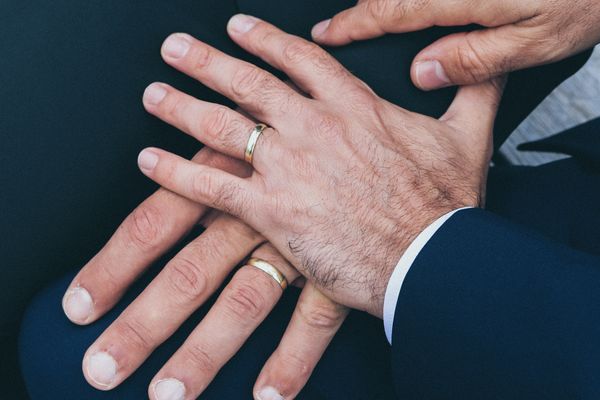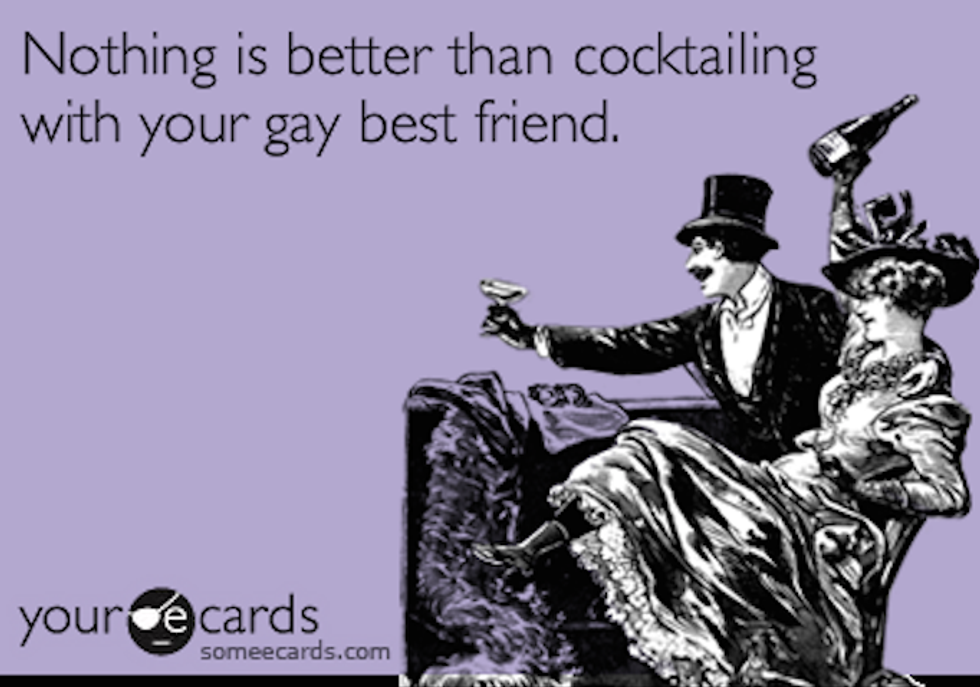During the summer of 2009, on a rainy playground somewhere in Fairfield County, Connecticut, I told an old friend of mine, my closest at the time, that I was gay.
I wasn't sure what the reaction would be. I grew up in a relatively liberal (albeit neoliberal) and affluent town where I was taught by both teachers and, more importantly, my family that gay people were natural, but it was always an educational afterthought. My studies at the time consisted of basic mathematics, American geography, and unfortunately the reading of the S.E. Hinton's unbearable bildungsroman The Outsiders. Needless to say, my education was lacking queer theory or any other study of human sexuality. So I wasn't really sure what to expect from my slightly younger, female friend.
Once I had fully confessed, my friend quite literally jumped for joy. In fact, she squealed with glee, running in circles around the playground complex, repeatedly and ecstatically proclaiming the same thing, over and over and over:
"I have a gay best friend! I have a gay best friend! I have a gay best friend!"
Jump forward a year later. I confided in a different friend, also female, the same thing. Her reaction was less energetic and yet basically the same:
"Awesome, I've always wanted a gay best friend."
Jump forward another year and the same dynamic persisted. Now part of a solidified friend ground, mainly composed of girls besides myself, and that term, "gay best friend," continued as an almost daily occurrence in my life.
High school was different, as the conservative, close-minded nature of my Alma Mater forced me back into the closet. And yet, many of my male or female friends who knew my sexuality would use that same label during private conversations.
My first year at my university and yet again the term reappears. Despite queerness being anything but a novelty at Wesleyan, there was still a perpetual need to label the gay kid as the gay kid. Perhaps it was my age or the fact that queer theory now composed much of my studies, but something struck me last year that never had previously.
Do straight people not realize that the use of "gay best friend" as a label is one of the most disrespectful and uncomfortable ways to tell a gay person that you accept them?
The addition of "gay" to the typically used title of "best friend" creates a strange dynamic that is not always as fun for the gay counterpart at it is the straight one. By separating this specific friend into his own very special category, his new honorary title might come off as more derogatory than you might think. Does this girl also have a vanilla "best friend?" If so, then logically the gay best friend is playing second fiddle to your straight, actually best friend. It implies that gays compete for friendship in a category separate from that of other straight friends.
You might think that I'm drawing some large conclusions based on even larger assumptions, so to support my argument I defer to the portrayal of women and their gay best friends in society and media.
The portrayal of gay friends in movies and television is relatively monotone: they are always specifically gay men, they are always vivacious and colorful, they love saying things like "honey" and snapping their fingers, and they are always white. There is a nigh unending archive of footage of gay men in movies removing all the clothes from their friend's closets and then taking them shopping. Maybe they stop at her drab apartment which the gay best friend will quickly fix up to be utterly fabulous, followed by celebratory mimosas.
And listen, I love mimosas as much as the next guy, but that isn't the point.
They don't usually show the girl and her gay best friend just staying in and watching a movie, or working together, or something more realistic in terms of friendship. Instead, there is always some odd act of reformation that the gay best friend is tasked with doing, whether it's new clothes or new decorations or a new boyfriend.
This "friendship" that the gay best friend is entitled to is one of servitude. Out of this portrayal comes a strange societal expectation: that your gay male friends are just supposed to do stuff for you. I don't mean like your homework or your taxes, but they, or we, are expected to be some sort of constant sidekick that doesn't necessarily get anything in return. We find you clothes, we clean your house, we stand behind you and provide snarky commentary for the audience to laugh at. The gay best friend never takes the center stage. The gay best friend is never the protagonist. He is nothing more than the "token gay," a character who exists to add a dash of flavor, comedy, and of course, faux progress to your film.
I remember last year on nights where my friends and I would prepare to hit the town, and one of them would promptly instruct me to be their "wingman." That's a perfectly reasonable request, wanting your friends to assist you on the hunt for a boy, I've always loved the thrill of the chase after all. But I also vividly recall several nights where I asked the same of them, and they refused because they "don't know how that works."
To clarify, "don't know how that works" means they don't understand gay hookup culture, or, for that matter, gay culture as a whole. In my case, I not only understand straight culture (because straight culture is shoved down my throat every day and I don't have a choice in that matter), but it is expected of me that I do. I have been told by friends after these nights where I was mandatorily cast as their wingman that I had "failed."
The fuck do you mean I failed?
And this is where the gay best friend fantasy that's illustrated through media and society completely falls apart. I'd be fully on board if being your gay best friend meant smoking weed, watching Baggage, and complaining about the patriarchy, and that's exactly what it is for many of my friends and I. But I've had a surprising amount of instances, occurring anytime between 7th grade and a week ago, where these perverted expectations of servitude arise.
It's not friendship, it's the commodification of queerness. It is a deliberate societal transformation of gay existence into a tool that serves straight people's needs. I'm not your "queer eye for the straight guy," I'm just a guy. I didn't come over to your room to look through your closet to tell you what's hot and what's not, I just wanted to ask you how your fucking day is going. Gay people are not some fabulous feather boa for you to wrap around your neck and take home on Thanksgiving to show your family that you're so college now.
This commodification is also one that erases other types of queer people, like lesbians, bisexuals, and particularly trans people. The lead white girl in your feel good film about finding the right guy in this crazy place we call New York City wouldn't work with a lesbian or transgender best friend; it has to be the physically fit and queeny gay guy with Milo Yiannapolis hair who saves the lead from her own wardrobe. Transgender characters are never casually in a story, they are either the main focus, giving you at least one or two guaranteed Emmys, or they aren't there at all. This is because people who are aware of trans issues might watch a show like Transparent because it's in the title. But if a trans character is just a random, maybe important maybe not, member of the cast, you'll shock people. You didn't prepare them for the shock of that trans character existing, and that's too much for modern American audiences.
Take a show like HBO's Looking, an example of, at least in my opinion, a great way to realistically portray modern gay life. The show's cast consisted almost entirely of gay men, besides one minor character who was a straight woman (which I loved, as it flipped the norm on its head).
Looking was canceled after two seasons due to a lack of viewership. I can't help but shake the feeling that Looking wouldn't have been canceled if it was about a group of white feminists living it up in Los Angeles with their gay best friend who appears for five minutes each episode to complete his duties. The fact that Looking made a show about gay people instead of just featuring gay people is a huge step in terms of queer representation, and it's a step that cost them a third season.
Because of Hollywood's stereotyped understanding of race and sexuality as completely separate entities, the gay best friend is almost never a person of color. This is mainly attributed to the studio's strategic thinking when it comes to representation: having a queer person of color on your show would look nice, but you're combining two minority groups into one character. It would be more efficient if they instead separated this queer person of color into two separate characters: one gay, one black; this way you have two tokens instead of one. Shows like Looking, Orange Is The New Black, and The Wire have all contained queer people of color, but these programs are some of the exceptions because of this way of thinking.
The term "gay best friend" is a homophobic slur in sheep's clothing. Queer people are proud of their queerness, as we should be, but that doesn't mean that straight people and society as a whole should verbally segregate us from their other friends. It also definitely doesn't mean that proudly declaring ourselves as queer means we're all the same. Queer is an umbrella term but don't let that erase the nuance and diversity that lies beneath it. If you just absolutely need to have a queer best friend, why not befriend someone who's a lesbian, or bisexual? Why not someone who's trans or gender neutral or asexual?
Hi, I'm Will. I like dancing, and making fancy cocktails, and talking about boys. But I also love video games and think that farting is really funny. My opinions and mannerisms do not neatly fall beneath a specific societal stereotype, and that's okay. If I expected you to do typical girl shit all the time, you'd think I was sexist. If you expect me to do typical gay shit all the time, I'll think you're a homophobe.
So no, I don't want to be your "gay best friend."
I just want to be friends.
























